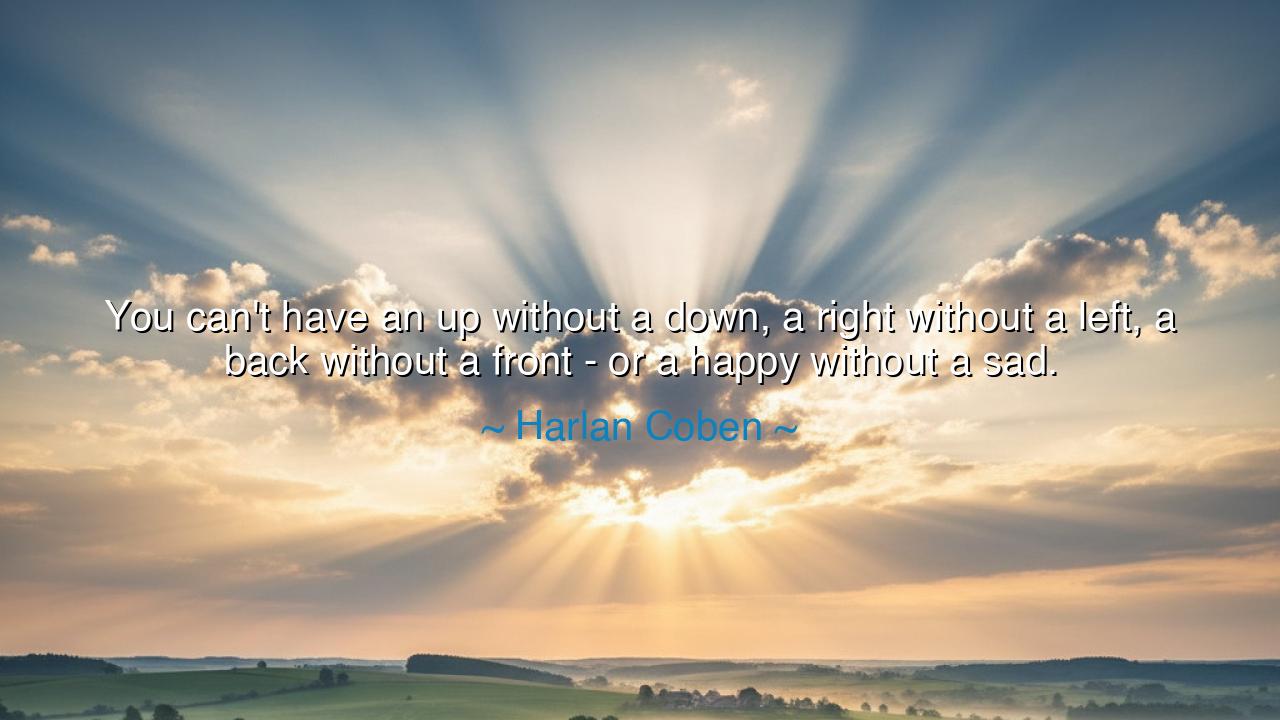
You can't have an up without a down, a right without a left, a
You can't have an up without a down, a right without a left, a back without a front - or a happy without a sad.






Harlan Coben, master of story and voice, has given us a truth that is both simple and eternal: “You can’t have an up without a down, a right without a left, a back without a front—or a happy without a sad.” At first it seems a playful observation, but hidden within it is the wisdom of the ages: the world is built on opposites, and without contrast, there is no meaning. The mountain cannot be high if there is no valley below. The light cannot dazzle if there is no darkness to give it depth. Joy cannot be savored unless sorrow has first been tasted.
The ancients spoke often of this eternal balance. In the East, the sages called it yin and yang—the union of opposites that form the whole. In Greece, philosophers taught that harmony is born of tension: Heraclitus declared, “The road up and the road down are one and the same.” Coben’s words echo this same timeless truth: life cannot be one note, else it ceases to be music. The song of existence requires rise and fall, silence and sound, triumph and despair. Without one, the other is meaningless.
Consider the story of Abraham Lincoln. He knew profound failure and grief—business lost, elections defeated, children buried. Yet it was precisely through these valleys of sorrow that he found the depth of spirit to lead a nation through its greatest trial. His moments of happiness in victory and unity shone all the brighter because they were carved from years of sadness and defeat. Without the shadow, the light of his achievements would not have been so brilliant, nor so deeply felt by his people.
We too, in our ordinary lives, often crave only the up, only the happy. Yet Coben reminds us that this is a false dream. To live fully is to embrace both sides of the coin, to understand that front and back, right and left, sorrow and joy—they define one another. If you try to cast out all pain, you will also dim your capacity for joy, for the heart grows in contrast, not in comfort. The bitter taste of loss prepares the soul to savor the sweetness of love.
This wisdom teaches us to see trials differently. When the day is heavy with grief, know that it is shaping your capacity to feel joy more deeply later. When you stumble and fall, know that this very fall gives meaning to the rise that is to come. Just as a sailor cannot know the power of the wind without the stillness of the air, so a human being cannot grasp the wonder of happiness without first bowing beneath the weight of sadness.
We can find this truth in the natural world. The seed must break apart, losing its form, before the plant can grow. The winter must come, stripping the trees bare, before the spring can clothe them in green. So it is with us: the seasons of the soul are not mistakes, but necessities. To demand endless summer is to demand death, for it is the cycle itself—the dance of opposites—that sustains life.
Therefore, let us not flee from sorrow, nor cling desperately to joy. Instead, let us walk the middle path of acceptance, knowing that one gives birth to the other. When joy comes, receive it with gratitude, knowing it will not last forever. When sorrow comes, endure it with courage, knowing it, too, will pass. In this balance lies freedom. In this understanding lies peace.
And so the lesson is clear: do not seek a life without downs, without lefts, without sadness—for such a life would be empty. Instead, embrace the wholeness of existence, its highs and lows alike. Learn to bless the storm as well as the sunshine, the darkness as well as the dawn. For it is only in knowing both that you come to know the fullness of life, and to live it not as a shadow, but as a flame.






AAdministratorAdministrator
Welcome, honored guests. Please leave a comment, we will respond soon